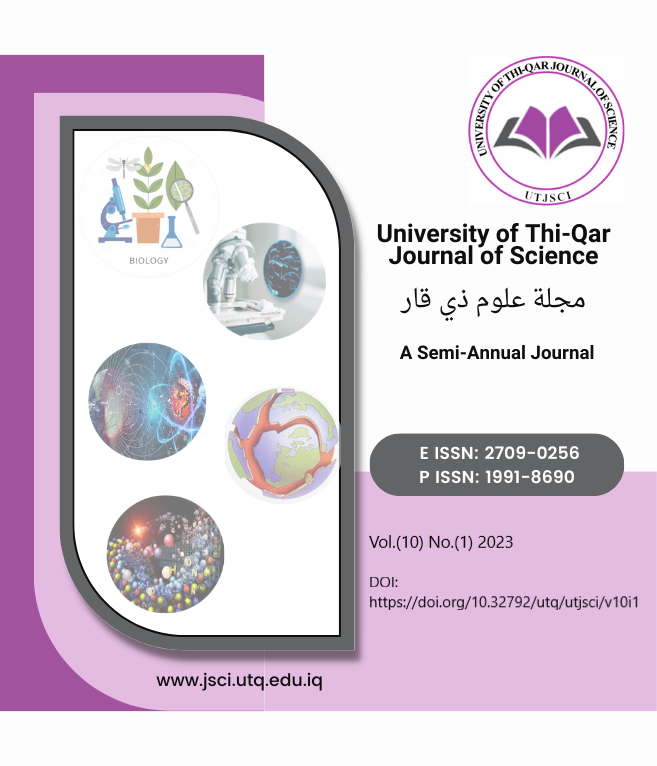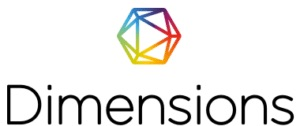Study the relationship between Selenium , Vitamin B6 , B12 and hyperhomocysteine in patients with cardiovascular disease in Thi-Qar Governorate
DOI:
https://doi.org/10.32792/utq/utjsci/v10i1.957Abstract
Cardiovascular diseases(CVD) which include ischemic heart disease, stroke, heart failure, peripheral arterial disease, and several other cardiac and vascular illnesses, are the world's leading cause of mortality and significantly lower life expectancy. The research included measuring and evaluating Homocysteine vitamin B6 , B12 and Selenium for cardiovascular patients. Methods: This study was conducted at Nasiriya Heart Center ,Nasiriya General Hospital and Biochemistry Laboratory in the College of science University of Thi-Qar in the period between (October ,2022 to March, 2023) . In formed oral consent was taken for patients. The study included 88 subjects , ages between (40 – 70 ) years. The subjects were divided into two groups : Control group included (38) supposed approximately healthy subject, and Patients group included (50) patients with Heart disease. Cases excluded from subjects: Kidney diseases, Liver failure, Thyroid diseases Immunological diseases, Urinary tract infections, Acute joint diseases Pregnant women, Diabetes. Results: There was a significant increase in homocysteine concentration in the blood serum of the patients group compared to the control group. Significant decrease in the level of vitamin B6 , B12 and Selenium in the serum of patients compared to the control group. Conclusions: The study indicated that homocysteine was elevated in cardiovascular patients, which is a risk factor for heart disease. In addition, the levels of vitamins B6, B12 and Selenium decreased against the increase in homocysteine through the negative relationship between homocysteine and vitamins B6, B12 and Selenium.
References
G. A. Mensah, G. A. Roth, C. O. Johnsonm, G. Addolorato, E. Ammirati, L. M. Baddour, and C. B. Noël, "Global Burden of Cardiovascular Diseases and Risk Factors, 1990–2019: Update From the GBD 2019 Study, " vol. 76, no. 25, 2020.
F. Paganelli, G. Mottola, J. Fromonot, M. Marlinge, P. Deharo, R. Guieu, and J. Ruf, "Hyperhomocysteinemia and cardiovascular disease: is the adenosinergic system the missing link?," vol. 22, no. 4, P. 8, 2021.
C. C. Mes, and F. M. Lewis, "Family history of cardiovascular disease, perceived cardiovascular disease risk, and health-related behavior: a review of the literature," vol. 29, no. 2, P. 1, 2014.
Z. Gao, Z. Chen, A. Sun , and X. Deng, "Gender differences in cardiovascular disease. Medicine in Novel Technology and Devices," vol. 4, P. 12, 2019.
C. C. Low Wang, C. N. Hess, W. R. Hiatt, and A. B. Goldfine, "mellitus: atherosclerotic cardiovascular disease and heart failure in type 2 diabetes mellitus–mechanisms, management, and clinical considerations," vol.133, no. 24, P.14, 2016.
T. Hasan, R. Arora, A.K. Bansal, R. Bhattacharya,G. S. Sharma, L. R. Singh, "Disturbed homocysteine metabolism is associated with cancer. Experimental & molecular medicine," vol. 51, no. 2, P. 21, 2019.
T. Rujaswini, D. Praveen, P. R. Chowdary, M. V. Aanandhi, and P. Shanmugasundaram, "A review on association of serum homocysteine in diabetic neuropathy," vol. 10, no. 2, 2018.
M. A. Khaleefah, I. I. Latif, A. A. Jaffer, "Homocysteinemia in Heart Failure," vol. 20, no. 1, P.15, 2021.
J. Xu, X. Zhao, S. Sun, P. Ni, C. Li, A. Ren, and L. Zhu, "Homocysteine and digestive tract cancer risk: a dose-response meta-analysis," vol. 2018, P. 18, 2018.
L. Hannibal, and H. J. Blom, "Homocysteine and disease:Causal associations or epiphenomenons? " vol. 53, 2017.
M. Hammed, and M. Ajah, "The relationship of Homocystein and some Biochemical parameters in hypertensive Patients from Thi-Qar Governorate," University of Thi-Qar, College of Science, 2022.
K. Stach, W. Stach, and K. Augoff, "Vitamin B6 in health and disease," vol. 13, no. 9, P. 17, 2021.
A. Hemminger, and B. K. Wills, "Vitamin B6 Toxicity," PMID: 32119387, P. 3, 2020.
M. Parra, S. Stahl, and H. Hellmam, "Vitamin B6 and its role in cell metabolism and physiology," vol. 7, no. 7, P. 22, 2018.
P. M. Ueland, A. McCann, Ø. Midttun, and A. Ulvik, "Inflammation, vitamin B6 and related pathways," vol. 53, 2017.
M. P. Wilson, B. Plecko, P. B. Mills, and T. P. Clayton, "Disorders affecting vitamin B6 metabolism," vol. 42, no. 4, P. 22, 2019.
M. J. Brown, M. A. Ameer, and K. Beier, "Vitamin B6 deficiency," PMID: 29261855, P. 22, 2017.
E. Mascolo, and F. Verni, "Vitamin B6 and diabetes: relationship and molecular mechanisms," vol. 21, no. 10, P. 23, 2020.
V. Lotto, S. W. Choi, and S. Friso, "Vitamin B6: a challenging link between nutrition and inflammation in CVD," vol.106, no.2, P. 13, 2011.
E. E. van de Lagemaat, L. C. de Groot, and E. G. van den Heuvel, "Vitamin B12 in relation to oxidative stress: a systematic review," vol. 11, no. 2, P. 25, 2019.
P. Sangle, O. Sandhu, Z. Aftab, A. T. Anthony, and S. Khan, " Vitamin B12 supplementation: preventing onset and improving prognosis of depression," vol. 12, no. 10, P. 26, 2020.
Y. Sun, M. Sun, B. Liu, Y. Du, S. Rong, G. Xu, and W. Bao, "Inverse association between serum vitamin B12 concentration and obesity among adults in the United States," vol. 10, 2019.
X. Chen, Y. Zhang, H. Chen, Y. Jiang, Y. Wang, D. Wang, and W. Yan, " Association of Maternal Folate and Vitamin B12 in Early Pregnancy With Gestational Diabetes Mellitus: A Prospective Cohort Study," vol. 44, no. 1, P. 6, 2021.
A. Sobczyńska-Malefora, E. Delvin, A. McCaddon, K. R. Ahmadi, and D. J. Harrington, "Vitamin B12 status in health and disease: a critical review. Diagnosis of deficiency and insufficiency – clinical and laboratory pitfalls," vol. 58, no. 6, P. 21, 2021.
R. Pawlak,"Is vitamin B12 deficiency a risk factor for cardiovascular disease in vegetarians," vol. 48, no. 6, P. 18, 2015.
G. Barchielli, A. Capperucci, and D. Tanini, "The role of selenium in pathologies: An updated review. Antioxidants,"vol. 11, no. 2, P. 27, 2022.
S. Hannibal, and S. Dharmaraj, "Selenium and selenoproteins: It’s role in regulation of inflammation. Inflammopharmacology," vol. 28, P. 6, 2020.
Q. Lv, X. Liang, K. Nong, Z. Gong, T. Qin, X. Qin, and Y. Zhu, "Advances in research on the toxicological effects of selenium," vol. 106, P. 6, 2021.
Y. Mehdi, J. L. Hornick, L. Istasse, and I. Dufrasne, "Selenium in the environment, metabolism and involvement in body functions," vol.18, no. 3, P. 13, 2013.
L. H. Duntas,"Selenium and at-risk pregnancy: challenges and controversies. Thyroid research," vol. 13, no. 1, P. 1, 2020.
B. K. Shimada, N. Alfulaij, and L. A. Seale, "The impact of selenium deficiency on cardiovascular function, " vol. 22, no. 19, P. 2, 2021.
A. Shalihat, A. N. Hasanah, R. Lesmana, A. Budiman, and D. Gozali, "The role of selenium in cell survival and its correlation with protective effects against cardiovascular disease: A literature review," vol. 134, 2021.
P. Ganguly, and S. F. Alam, "Role of homocysteine in the development of cardiovascular disease," vol. 14,no. 1, P. 10, 2015.
A. Ahmed, M. T. Corban, T. Toya, J. D. Sara, B. Lerman, J.Y. Park and A. Lerman, "Coronary microvascular endothelial dysfunction in patients with angina and nonobstructive coronary artery disease is associated with elevated serum homocysteine levels. Journal of the American Heart Association, " vol. 9, no. 19, P. 30, 2020.
N. Jin, L. Huang, J. Hong, X. Zhao, Y. Chen, J. Hu, and J. Pu, "Elevated homocysteine levels in patients with heart failure: A systematic review and meta-analysis," vol. 100, no. 33, P. 20, 2021.
Z. Zhang, L. Wang, Y. Zhan, C. Xie, Y. Xiang, D. Chen, and Y. Wu, "Clinical value and expression of Homer1, homocysteine, S-adenosyl-l-homocysteine, fibroblast growth factors 23 in coronary heart disease," vol. 22, no. 1, P.12, 2022.
Y. Zhao, and J. Zhang, "Clinical implication of homocysteine in premature acute coronary syndrome female patients: Its distribution and association with clinical characteristics and major adverse cardiovascular events risk," vol. 100, no. 18, P. 7, 2021.
S. Friso, V. Lotto, R. Corrocher, and S. W. Choi, "Vitamin B6 and cardiovascular disease. Water Soluble Vitamins: Clinical Research and Future Application," vol. 56, no. 2, 2012.
J. Wei, and S. J. Ji, "Modification of vitamin B6 on the associations of blood lead levels and cardiovascular diseases in the US adults," vol. 3, no. 2, P. 12, 2020.
J. Jeon, and K. Park, "Dietary vitamin B6 intake associated with a decreased risk of cardiovascular disease: A prospective cohort study," vol. 11, no. 7, P. 29, 2019.
T. Kumrungsee, P.Zhang, N. Yanaka, T. Suda, and N. Kato, "Emerging cardioprotective mechanisms of vitamin B6: a narrative review," vol. 61, no. 2, P. 26, 2022.
H. N. Kim, Y. M. Eun, and S. W. Song, "Serum folate and vitamin B12 levels are not associated with the incidence risk of atherosclerotic events over 12 years: the Korean Genome and Epidemiology Study," vol. 63, Pages 34-41, 2019.
I. Capelli, G. Cianciolo, L. Gasperoni, F. Zappulo, F. Tondolo, M. Cappuccilli, and G. La Manna, "Folic acid and vitamin B12 administration in CKD, why not?. Nutrients, "vol. 11, no. 2, P. 13, 2019.
E. Azzini, A. Raguzzini, and A. Polito, " A brief review on vitamin B12 deficiency looking at some case study reports in adults. International journal of molecular sciences," vol. 22, no. 18, P. 7, 2021.
C. Benstoem, A. Goetzenich, S. Kraemer, S. Borosch, W. Manzanares, G. Hardy, and C. Stoppe,"Selenium and Its Supplementation in Cardiovascular Disease What do We Know? ," vol.7, no. 5, P. 27, 2015.
Downloads
Published
License
Copyright (c) 2023 University of Thi-Qar Journal of Science

This work is licensed under a Creative Commons Attribution 4.0 International License.













